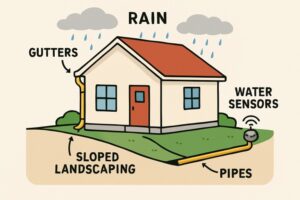Key Takeaways
- Regular maintenance of plumbing and appliances is crucial to prevent leaks.
- Proper roof and gutter care directs water away from your home’s foundation.
- Installing water detection devices offers early warnings of potential issues.
- Landscaping and grading are vital in managing water flow around your property.
Table of Contents
- Introduction
- Regular Plumbing Inspections
- Roof and Gutter Maintenance
- Install Water Detection Devices
- Landscaping and Grading
- Appliance Maintenance
- Monitor Water Pressure
- Know Your Water Main
- Prepare for Vacations
Introduction
Water damage is one of the most expensive and disruptive issues a homeowner can face. Left unchecked, it can lead to structural problems, rot, and mold, posing costly repairs and health risks for your family. Taking proactive steps today can help you deter these hazards and safeguard your property. If you have experienced or want to prevent water damage Charlotte, knowing the best practices for prevention and timely response is crucial for protecting your home year-round.
Effective water damage prevention involves a combination of regular maintenance, smart home upgrades, and awareness about your home’s vulnerabilities. This comprehensive guide offers practical strategies you can implement right away to shield your home from the threat of unwanted water intrusion, saving you money and worry down the road.
Regular Plumbing Inspections
Routine plumbing inspections are one of the simplest yet most effective ways to prevent water damage. Examine pipes under sinks, around toilets, and near appliances for any signs of leaks, corrosion, or moisture buildup. Often, minor leaks can worsen over time, resulting in more costly repairs and even encouraging mold growth if not caught early. Promptly addressing minor problems can prevent them from developing into bigger, more expensive issues. For detailed advice on detecting early plumbing problems, check out This Old House’s guide to finding water leaks.
Roof and Gutter Maintenance
Your roof and gutters are vital in keeping water out of your home. Inspect your roof regularly for damaged, lifted, or missing shingles that could let moisture inside. Keep gutters and downspouts clear of debris, such as leaves and twigs so that water can flow freely from your foundation. Clogged gutters often cause water to back up and seep beneath the roofline or down into your basement, leading to hidden water damage or even foundation cracks over time. Prioritizing roof and gutter maintenance helps protect your home’s structural integrity throughout the seasons.
Install Water Detection Devices
Advancements in smart home technology now allow homeowners to monitor areas most vulnerable to leaks, such as basements, laundry rooms, and under sinks. Water leak detectors offer early warnings when moisture is detected in these spaces, enabling swift intervention. Some devices shut off your main water supply automatically if a large leak occurs, drastically minimizing property damage. With these sensors placed strategically around your home, you gain valuable peace of mind knowing you’ll be alerted to a problem long before it escalates.

Landscaping and Grading
Proper landscaping isn’t just for curb appeal—it’s also critical in preventing water from pooling near your foundation. The ground around your home should slope away from the structure, not toward it. This simple measure ensures rainwater and runoff are directed away, reducing the risk of water seeping into basements and crawl spaces. Additionally, mulch and strategically placed plants should be considered to help absorb excess moisture. The InterNACHI guide to basement waterproofing offers more tips on using landscaping as a water barrier.
Appliance Maintenance
Large household appliances are frequent culprits for leaks and water damage. Inspect water heaters, dishwashers, washing machines, and refrigerators regularly for cracked hoses, loose fittings, or damp spots. Replace old hoses—especially those more than five years old—with updated burst-proof versions. Adding water detection sensors near these appliances can help you catch leaks the moment they happen, ensuring small drips don’t become expensive repairs.
Monitor Water Pressure
Excessive water pressure, while appealing for showers, can stress your plumbing system and increase the likelihood of leaks or burst pipes. Most homes perform best with water pressure between 40 and 70 psi. Use a pressure gauge to check your levels and install a pressure regulator to maintain a safe range. This is a straightforward preventative step that can extend the lifespan of your pipes and fixtures.
Know Your Water Main
Knowing the location of your water shut-off valve is vital for every household member. A fast response to a sudden leak can mean the difference between minor cleanup and major renovation. If a pipe bursts, turning off the water main quickly stops the water flow, protecting your floors, walls, and cherished belongings from further harm. Please ensure everyone in your home knows where it’s located and how to operate it in a plumbing emergency.
Prepare for Vacations
If you will be away for a while, extra precautions can safeguard your home from water damage during your absence. Shutting off the main water supply, inspecting for any visible leaks, and having a trusted neighbor or friend check on your home periodically are all excellent measures. Some homeowners go further by turning off individual supply valves to specific appliances or installing smart water sensors that send notifications to their phone if a problem arises. For extended trips or during cold seasons, it’s also wise to drain outdoor faucets to prevent frozen pipes.
Staying vigilant and practicing regular home maintenance are your strongest defenses against water damage. By acting on these proactive tips, you help create a safer, drier living environment and avoid the stress and costs associated with avoidable water disasters.

